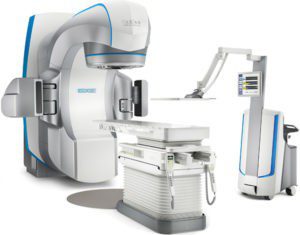

The National Cancer Institute estimates that in 2019, 145,600 patients were diagnosed with this disease and 51,060 individuals died of colorectal cancer.
With regards to colorectal cancer, it is possible to significantly decrease the incidence, morbidity and mortality and increase cure, if diagnosed early. This is done through early detection screening.
Colonoscopy is recognized as the number one way to reduce the risk of colon cancer. During a colonoscopy a flexible lighted scope is used to evaluate your rectum and colon and a tool is used to remove tissue that might have any abnormal growth, known as polyps.
Everyone at the age of 45 should undergo screening colonoscopy. Individuals who should undergo earlier screening include, a specific family history of colon cancer, familial syndromes and patients with inflammatory bowel disease.
If cancer is discovered on colonoscopy it is important to understand that the workup and treatment colon and rectal cancer differ. Colon cancer is primarily treated with surgery, with laparoscopic or robotic equipment, however at times larger incisions are required. After surgery some patients require chemotherapy based on the stage of the cancer. Very rarely and only in special instances would one require radiation in treating colon cancer.
The type of treatment for rectal cancer is based on the stage worked up before surgery. Treatment can include surgery alone or involve a regime of chemotherapy and radiation followed by surgery and thereafter chemotherapy. Sometimes there are instances when all the necessary chemotherapy and radiation takes place before surgery. Surgical approaches include laparoscopic and robotic surgery.
Although surgery alone or in combination with chemotherapy and radiation when indicated can potentially cure colon and rectal cancer, colonoscopy is essential for prevention.
Radiation therapy uses high-energy rays (such as x-rays) or particles to destroy cancer cells. It is more often used to treat people with rectal cancer than for people with colon cancer. For some colon and rectal cancers, treating with chemotherapy at the same time can make radiation therapy work even better. Using these two treatments together is called chemoradiation or chemoradiotherapy.
Radiation Therapy For Colon Cancer
Radiation is not commonly used to treat colon cancer and is generally used as an adjunct to surgical treatment. One instance it is used to assist in the treatment of colon cancer is if the cancer has attached itself to a structure or the lining of the abdomen and cannot be entirely removed safely. If this happens, radiation therapy may be used to kill any cancer cells that may have been left behind. Radiation therapy can also be used to help treat cancer that has spread to other organs, such as the lungs, bones or brain.
Radiation Therapy For Rectal Cancer
Radiation therapy is more commonly used to treat certain stages of rectal cancer. It can be used before surgery along with chemotherapy to help shrink the tumor and make it easier to remove, increase survival and decrease risk of tumor coming back. Radiation therapy can also be used for palliative measures to ease symptoms of advanced cancer including bleeding or pain. Similar to colon cancer, radiation therapy can also be used to help treat cancer that has spread to other organs. For cases such as these advanced radiation therapy technology may offer safer and more effective treatment than standard radiotherapy. For such cases, the Varian Edge provides a sophisticated solution of highly precise and accurate radiotherapy.
Contact our office at (239) 275-0728 to schedule an appointment. www.thecolorectalinstitute.com
www.21co.com | (239) 772-3202
The Colorectal Institute
Valerie Dyke, MD, FACS, FASCRS, Janette Gaw, MD, FACS, FASCRS,
Nagesh Ravipati, MD, FACS, FASCRS and Jeffrey A. Neale, MD, FACS, FASCRS
 Southwest Florida's Health and Wellness Magazine Health and Wellness Articles
Southwest Florida's Health and Wellness Magazine Health and Wellness Articles

